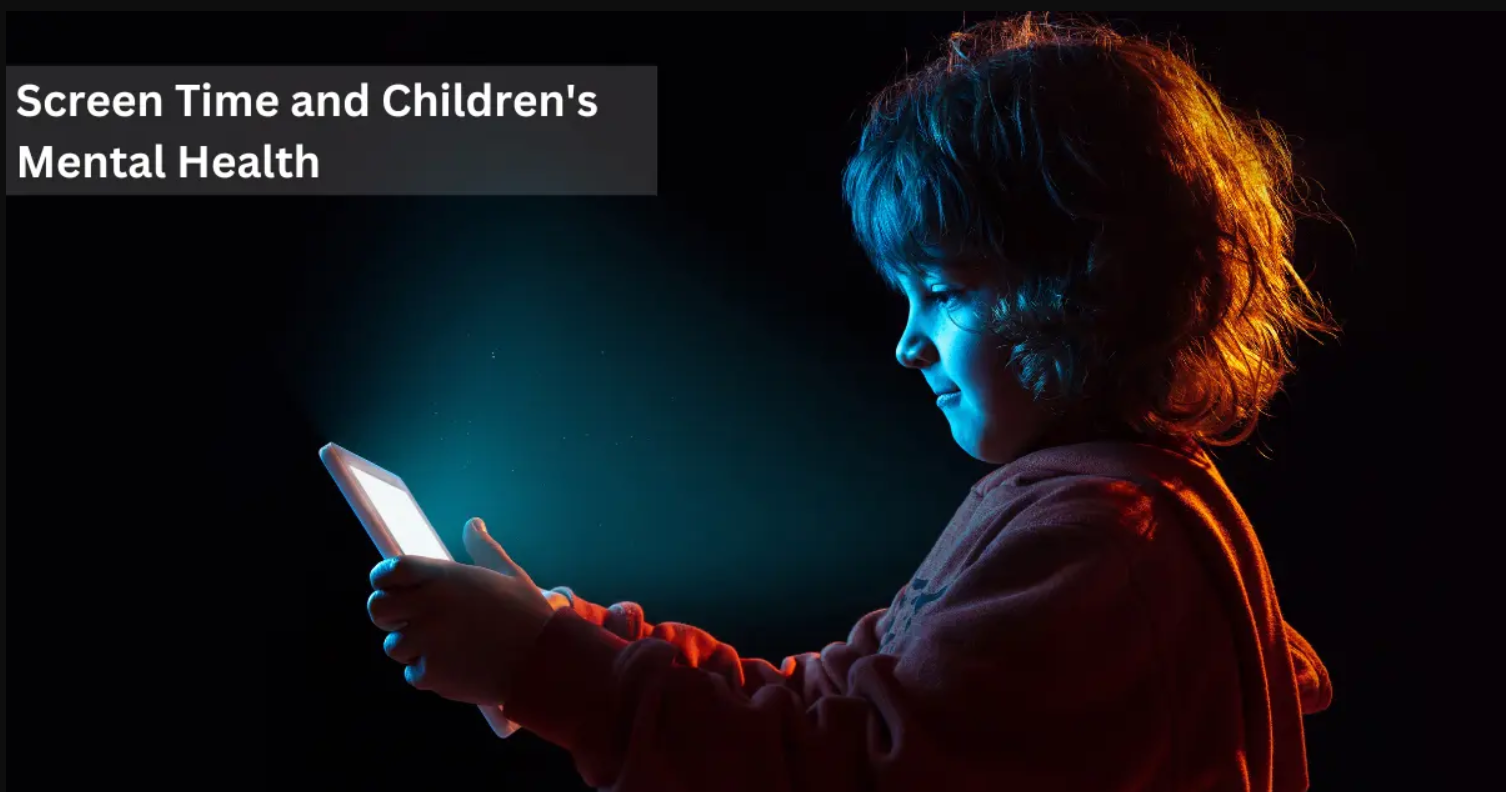9 Tips to Control Screen Time for Mental Wellness:
Control Screen Time for Mental Wellness: Screens are become a necessary component of everyday life in our digital world. We spend a large amount of our day in front of a screen, whether for work, play, or socialising. Even if technology has completely changed the way we work and live, spending too much time in front of a screen can be detrimental to our physical and emotional well-being.
Excessive screen time has been connected to a number of mental health problems, ranging from anxiety and depression to disturbed sleep and strained relationships. The good news is that we can control our screen time for a better balance if we make an effort and use mindful techniques. We’ll look at how to properly control screen time in order to enhance your mental health in this extensive tutorial.

1. Recognising How Too Much Screen Time Affects Mental Health.
Understanding how screen usage impacts mental health is crucial before moving on to remedies. Excessive screen time, particularly on social media and late at night, has been linked to serious emotional and psychological problems, according to research.
Increased Anxiety and Stress: Prolonged exposure to digital material, particularly when it involves unfavourable news or social media comparisons, can raise stress levels. This is one of the main effects of excessive screen time. Anxiety can be made worse by FOMO, or the fear of missing out.
Loneliness and Depression: Research has shown a direct correlation between heavy social media use and depressive, lonely, and isolated sensations.
Sleep Disturbance: The hormone melatonin, which controls sleep, is disrupted by the blue light that screens emit. Poor sleep or insomnia may result from this, which can have a detrimental effect on mental health.
Decreased Focus and Cognitive Function: It has been demonstrated that extended screen usage, especially multitasking between applications and devices, gradually impairs cognitive function and attention span.
The first step to controlling your screen habits and enhancing your general mental health is being aware of these consequences.
2. Clearly Define Screen Use Boundaries.
Establishing deliberate, unambiguous boundaries is one of the best strategies for controlling screen use. This lessens the amount of time spent online scrolling aimlessly.
Advice on Defined Boundaries:
Establish Screen-Free Areas: Set aside particular spaces in your house where using screens is prohibited. This could be the bedroom, dining area, or any other area used for socialising and resting.
Restrict Your Use of Social Media: Establish daily time restrictions for the amount of time you spend on social media. Use third-party apps or the built-in features of your smartphone to keep an eye on and manage consumption.
Block of Time for Work and Play: Set aside particular periods of time for work-related or study-related screen time and keep them apart from recreational screen time. You can keep a healthy balance by dividing up your digital life into several areas.
You may take back control of how and when you interact with screens by intentionally establishing boundaries, which lowers the possibility of spending hours browsing aimlessly.
3. Make Digital Detoxes Part of Your Daily Routine.
Taking a vacation from screens for a predetermined amount of time is known as a digital detox. By lowering stress and encouraging mindfulness, this can have a substantial positive impact on mental health and last anywhere from a few hours to several days.
How to Perform a Digital Cleanse:
Plan Frequent Days of Detoxification: Take a digital vacation on the weekends or designate one or two days every week to be screen-free. Take use of this opportunity to exercise, spend time in nature, or pursue a creative activity.
Unplug Before Bed: Make a commitment to shutting off all electronics 1 hour before to going to bed. This enhances the quality of your sleep and frees your mind from electronic distractions.
Establish a “No Screen” Day: Every month, set aside an entire day (or weekend) to completely abstain from screens. Make use of this time to concentrate on other pursuits that enhance mental health, such reading, cooking, or spending time with close friends and family.
With the help of digital detoxes, your brain can recuperate from prolonged screen time, improving mood, reducing stress, and improving sleep.
4. Pay Attention to the Information You Take in.
Your mental health is greatly impacted by what you do on screens. Your mood and general well-being can be affected both immediately and over time by consuming depressing or anxiety-inducing content.
Techniques for Consuming Content With Awareness:
Organise Your Social Media Feed: Follow accounts that uplift, inform, or simply make you smile. Content that encourages negativity, comparison, or anxiety should be unfollowed or muted.
Reduce Your News Consumption: Although it’s critical to remain informed, consuming sensationalised or unfavourable news all the time can make you feel more stressed. Avoid checking the news the rest of the day and set out specific times to do it.
Participate in uplifting virtual communities: Seek out online communities or discussion boards that centre around hobbies, mental health, or subjects that you find enjoyable. Being in encouraging, upbeat settings can improve your attitude and feeling of identity.
By being aware of the material you take in, you can make screens a stress-relieving rather than enriching tool.
5. Use Technology to Establish Screen Time Limits.
We can manage our screen time with the aid of the very gadgets that contribute to it. There are built-in tools on computers and cellphones to assist monitor and restrict screen time.
Features and Tools to Assist with Screen Time Management:
Apple Screen Time: This feature on iPhones and iPads lets you measure usage, set daily restrictions for certain apps, and plan downtime for concentrated offline activities.
Android Digital Wellbeing: Android gadgets come with capabilities to track screen usage, program app timers, and even activate Do Not Disturb settings for particular times of day.
Third-Party Apps: To help you concentrate and cut down on distractions, apps like Freedom, RescueTime, and StayFocusd let you block specific websites or apps.
6. Engage in offline self-care and mindfulness exercises.
Including mindfulness and non-screen-based self-care techniques is one of the greatest strategies to balance screen time. You may preserve mental clarity, lower anxiety, and feel grounded by engaging in these activities.
Offline Mindful Activities:
Meditation: Practice mindfulness on your own or use apps that offer guided meditation. The stress that comes with using screens too much can be lessened and the mind calmed by meditation.
Exercise: Whether it’s yoga, strolling, or a more strenuous workout, regular exercise can reduce stress, elevate mood, and enhance cognitive performance.
Creative Hobbies: Take part in artistic pursuits like cooking, knitting, painting, or journaling. These pastimes give you a feeling of achievement and help you concentrate on the here and now.
7. Make Use of Screens
Screen time is not all the same. Certain screen hobbies can be instructive, enriching, and good for mental health, but others might lead to stress or burnout. Making deliberate use of displays is crucial.
Ideas for Purposeful Screen Time: Education and Personal Growth: Make use of your screen time to view documentaries, read scholarly articles, or enrol in online courses. By doing this, you can prevent idle scrolling and learn new things.
Socialising with Purpose: Rather than just passively consuming content, have meaningful conversations with friends and family through text or video chats.
Creative Projects: Take part in creative activities like writing, graphic design, or photography by using screens. These pursuits provide one a sense of success and mental stimulation.
You can make sure that your digital time enhances your life rather than harms your mental health by using screens purposefully.
8. Step Outside and Enjoy Nature.
Spending time outside helps mitigate the harmful effects of excessive screen time, and nature has long been recognised for its therapeutic advantages. Natural environments, sunlight, and fresh air all help to refresh the mind and support mental health.
Outdoor Exercises to Maintain Equilibrium Time Spent on Screens:
Take a stroll: Taking a regular stroll in a park or other natural setting might help you decompress, feel less stressed, and feel happier.
Outdoor Recreation and Sports: Take part in outdoor pursuits such as cycling, hiking, or even gardening. Exposure to outdoors and physical activity have significant positive effects on mental health.
Engage in Mindful Nature Observation: Spend some time sitting outside and using all of your senses to examine your environment. This exercise develops mindfulness and strengthens one’s bond with the here and now.
You can balance screen time with experiences that support your mental health and general well-being by scheduling time for outdoor activities.
9. Put Sleep Hygiene First and Limit Screen Time at Night.
One of the most important factors in controlling your mental health is the connection between screen time and sleep. Overusing displays before bed, especially those that generate blue light, such as laptops, tablets, and cellphones, can interfere with the quality of your sleep and throw off your circadian cycle.
Advice for Developing Better Sleep Habits:
Avoid using screens for at least an hour before bedtime by establishing a screen curfew. Instead, take part in soothing pursuits like meditation, a warm bath, or reading a book.
Use Blue Light Filters: You can install applications that assist reduce screen glare in the evening or use the settings on many devices to limit your exposure to blue light.
Establish a Calm Bedtime Routine: Take part in soothing activities that let your body know it’s time to unwind. You get more and better sleep as a result of this.
Your mental health and general well-being can be significantly enhanced by prioritising good sleep hygiene and minimising screen use at night.
